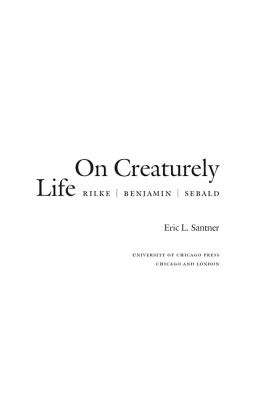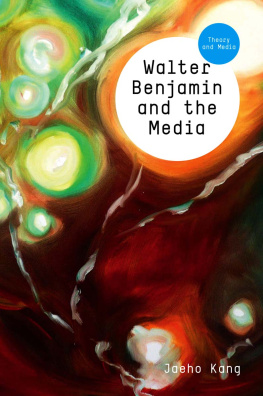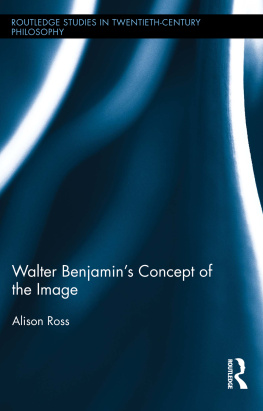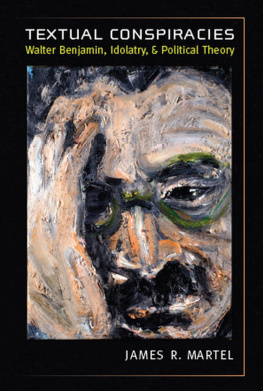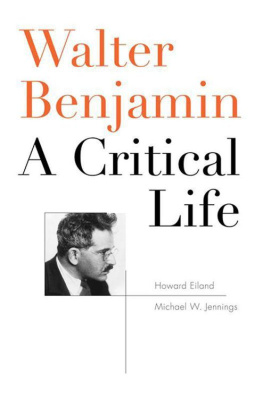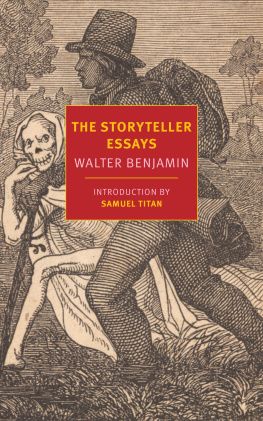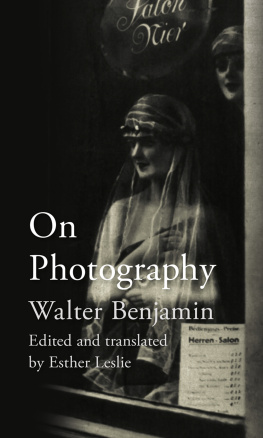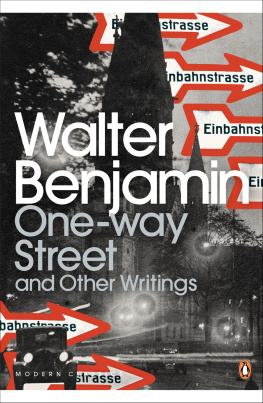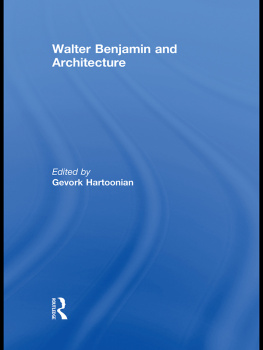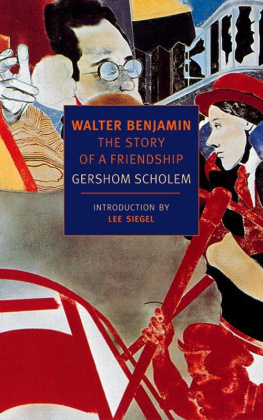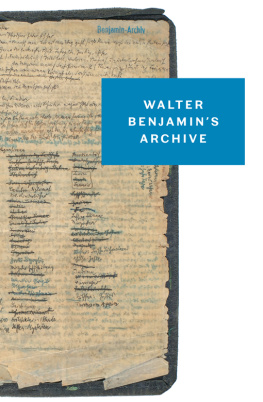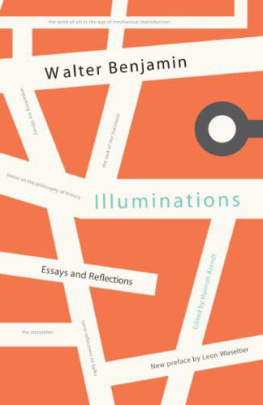Benjamin Walter - On creaturely life: Rilke, Benjamin, Sebald
Here you can read online Benjamin Walter - On creaturely life: Rilke, Benjamin, Sebald full text of the book (entire story) in english for free. Download pdf and epub, get meaning, cover and reviews about this ebook. City: Chicago, year: 2006, publisher: The University of Chicago Press, genre: Science. Description of the work, (preface) as well as reviews are available. Best literature library LitArk.com created for fans of good reading and offers a wide selection of genres:
Romance novel
Science fiction
Adventure
Detective
Science
History
Home and family
Prose
Art
Politics
Computer
Non-fiction
Religion
Business
Children
Humor
Choose a favorite category and find really read worthwhile books. Enjoy immersion in the world of imagination, feel the emotions of the characters or learn something new for yourself, make an fascinating discovery.
- Book:On creaturely life: Rilke, Benjamin, Sebald
- Author:
- Publisher:The University of Chicago Press
- Genre:
- Year:2006
- City:Chicago
- Rating:5 / 5
- Favourites:Add to favourites
- Your mark:
- 100
- 1
- 2
- 3
- 4
- 5
On creaturely life: Rilke, Benjamin, Sebald: summary, description and annotation
We offer to read an annotation, description, summary or preface (depends on what the author of the book "On creaturely life: Rilke, Benjamin, Sebald" wrote himself). If you haven't found the necessary information about the book — write in the comments, we will try to find it.
On creaturely life: Rilke, Benjamin, Sebald — read online for free the complete book (whole text) full work
Below is the text of the book, divided by pages. System saving the place of the last page read, allows you to conveniently read the book "On creaturely life: Rilke, Benjamin, Sebald" online for free, without having to search again every time where you left off. Put a bookmark, and you can go to the page where you finished reading at any time.
Font size:
Interval:
Bookmark:
The University of Chicago Press, Chicago 60637
The University of Chicago Press, Ltd., London
2006 by The University of Chicago
All rights reserved. Published 2006
Printed in the United States of America
15 14 13 12 11 10 09 3 4 5
ISBN: 0-226-73502-8 (cloth)
ISBN: 0-226-73503-6 (paper)
ISBN 978-0-226-73505-4 (e-book)
Library of Congress Cataloging-in-Publication Data
Santner, Eric L., 1955
On creaturely Life : Rilke, Benjamin, Sebald / Eric L. Santner.
p. cm.
Includes bibliographical references and index.
ISBN 0-226-73502-8 (colth: a lk. paper)
ISBN 0-226-73503-6 (pbk.: alk. paper)
I. Sebald, Winfried Georg, 1944Criticism and interpretation. 2. Psychoanalysis and literature. 3. Rilke, Rainer Maria, 18751926Influence. 4. Melancholy in literature. 5. Benjamin, Walter, 18921940Influence. I. Title.
PT2681.EI8Z84 2006
833.914dc22
2005027453
 The paper used in this publication meets the minimum requirements of the American National Standard for Information SciencesPermanence of Paper for Printed Library Materials, ANSI Z39.481992.
The paper used in this publication meets the minimum requirements of the American National Standard for Information SciencesPermanence of Paper for Printed Library Materials, ANSI Z39.481992.
Eric L. Santner
UNIVERSITY OF CHICAGO PRESS
CHICAGO AND LONDON
FOR Slavoj AND Analia
In the text I provide page references to both German and English editions of Sebalds major works (German page numbers follow the slash). I used the following editions:
Nach der Natur: Ein Elementargedicht. Frankfurt a.M.: Fischer, 1995.
After Nature. Trans. Michael Hamburger. New York: Modern Library, 2003.
Schwindel. Gefhle. Frankfurt a.M.: Fischer, 1996.
Vertigo. Trans. Michael Hulse. New York: New Directions, 1999.
Die Ausgewanderten: Vier lange Erzhlungen. Frankfurt a.M.: Fischer, 1996.
The Emigrants. Trans. Michael Hulse. New York: New Directions, 1996.
Die Ringe des Saturn. Frankfurt a.M.: Fischer, 1998.
The Rings of Saturn. Trans. Michael Hulse. New York: New Directions, 1999.
Austerlitz. Munich: Hanser, 2001.
Austerlitz. Trans. Anthea Bell. New York: Modern Library, 2001.
In this book I attempt to develop further certain lines of thought introduced in previous work, above all in my On the Psychotheology of Everyday Life, a study of Franz Rosenzweigs thought in light of psychoanalytic theory. More important, what served as an epilogue for that worka series of short reflections on the implications of psychotheological thought for the understanding of literaturemoves to the center of this book. I hope that this approach will open up new ways of thinking about literature (and not just the work of my primary point of reference, W. G. Sebald); and I also hope that, by engaging with literary texts, the conceptual relations that make up the field of what I call psychotheology will become more tangible.
The basic intuition at the heart of Psychotheology the messianic dimension of thought and action turns on our understanding of the concept of the neighbor, of what it means to engage in acts of neighbor love, and ultimately what it means (and doesnt mean) to work to make room in the world for such love.
A good part of the first volume of the Star develops what in many ways looks like a psychoanalytic view of the self, a drive theory of human him- or herself. What led me in this project to focus so exclusively on the work of W. G. Sebald was my sense that his literary writings were singularly obsessed with developing the means to engage with the neighbor in his or her creaturely expressivity, that his entire oeuvre could be seen as the construction of an archive of creaturely life.
Winfried Georg Maximillian Sebald, who died in 2001 at the age of fifty-seven in a car accident outside his home in Norwich, England, became something of a literary star in the 1990s after spending some twenty years as a professor of German literature at the University of East Anglia. His meteoric rise to literary greatnessa phrase used by Susan Sontag in a review of his workcame through a series of remarkable volumes of semidocumentary prose fiction that he began to write only in midlife. Perhaps because he was himself an emigranthe moved to England in the late 1960shis literary reputation was in large part made through his receptionone should perhaps say lionizationin the English-speaking world (though he won a number of major literary prizes in Germany, there his work was met with considerably more skepticism and ambivalence). One might say that he was the first German writer of recent memory whose work was immediately registered as being canonical; here was a writer who seemed truly to belong in the company of the very authors to whom he frequently alluded and from whom he freely borrowed in his work: Stendhal, Stifter, Keller, Kafka, Robert Walser, and Thomas Bernhard, among others.
The difficulty of categorizing Scholem, Adorno, and Celan, to name just its most prominent representatives.
In a review of Sebalds first foray into creative writing, a book-length prose poem called After Nature (Nach der Natur), Eva Hoffman adumbrated the notion of natural history without ever naming it or the intellectual heritage behind it. The book deals with three figures separated by centuries: the great early The theme of the ending of time within time, a constant of the apocalyptic imagination, clearly haunts Sebalds writing and the figures that populate his work.
But there is a more specific sense of natural history at work in Sebalds vision of the nexus of the natural and the human, one that Walter Benjamin developed over the course of his career. As we shall see, Sebalds writing is deeply indebted to the Benjaminian view that at some level we truly encounter the radical otherness of the natural world only where it appears in the guise of historical remnant. The opacity and recalcitrance that we associate with the materiality of naturethe mute thingness of natureis, paradoxically, most palpable where we encounter it as a piece of human history that has become an enigmatic ruin beyond our capacity to endow it with meaning, to integrate it into our symbolic universe. Where a piece of the human world presents itself as a surplus that both demands and resists symbolization, that is both inside and outside the symbolic orderfor Benjamin, this is the unnerving point of departure of the allegorical imaginationthat is where we find ourselves in the midst of natural history. What I am calling creaturely life is a dimension of human existence called into being at such natural historical fissures or caesuras in the space of meaning. These are sites where the struggle for new meaningin Nietzsches terms, the exercise of will to poweris at its most intense. And it is precisely at such fissuressites that can persist as uncanny loci of alterity within the order of meaningthat we will find W. G. Sebald at work.
At various points in this book I will turn to the work of a poet who has until now not been generally viewed as one of Sebalds it is, I think, in Rilkes great novel of urban life, The Notebooks of Malte Laurids Brigge, that we find the greatest resources for developing a feel for Sebalds method, for the spectral materialism that informs his project.
In Rilkes novel, the first-person narrator-diarist Malte Laurids Brigge, a young, now impoverished Dane of aristocratic background struggling to become a writerattenuous distinctions he works at sustaining between himself and the outcastsdistinctions sustained only at the cost of a degree of shame he is constantly made aware ofwill be shown to be insupportable.
Next pageFont size:
Interval:
Bookmark:
Similar books «On creaturely life: Rilke, Benjamin, Sebald»
Look at similar books to On creaturely life: Rilke, Benjamin, Sebald. We have selected literature similar in name and meaning in the hope of providing readers with more options to find new, interesting, not yet read works.
Discussion, reviews of the book On creaturely life: Rilke, Benjamin, Sebald and just readers' own opinions. Leave your comments, write what you think about the work, its meaning or the main characters. Specify what exactly you liked and what you didn't like, and why you think so.

